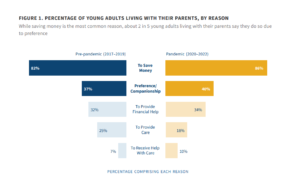
As the news goes, in the Western world, young millennials and Gen Zers are moving back to their parents’ homes – if they ever left. Suffering the consequences of the 2008 financial crisis first and affected by the sudden economic contraction resulting from the pandemic later, many young adults cannot afford rent. Let alone consider saving to buy a house in a reasonably short period.
Most studies agree that the main reason for what is seen as a growing trend is financial. Wages have slowly increased in the decades, but rent, utilities, and even the prices of simple commodities have, in some cases, skyrocketed. The purchasing power of individuals has dropped, and, clearly, salaries have not followed suit.
High housing prices aside, younger adults spend more time studying, finding an occupation later, and at least postponing to start a family. Many have returned to live with their parents in the last two decades. But, contrary to what many headlines report, the trend is not unheard of in terms of size and numbers. The actual situation is, in fact, similar to the picture recorded the year before the pandemic started. And it is too simplistic to consider the phenomenon as a sensation – argues PRB (Population Reference Bureau). In their recent analysis “In the Nest”, the non-profit organization questions whether COVID-19 pushed young adults back to their family homes. Not so much of a spoiler: it did not really. Or better said, it exacerbated an already ongoing trend and, in some cases, the result of a conscious choice rather than only a need.

Financial gain
Gen Zers struggle economically. Even if they work, the costs they have to sustain when they leave the family nest are more burdensome than those the previous generations had to face. Many are not only going/have gone back to their parents’ houses but are postponing, if not erasing altogether, the prospect of buying a house. But, as PRB research underlines, some of those who moved back in and those who have never left choose to live with their parents to save money to buy a house.
According to the National Association of Realtors, as reported by the WSJ, “In 2022, the share of first-time buyers who moved directly from a friend’s or family member’s home and into their own, hit 27 per cent,” the highest share since the group started keeping track almost 35 years ago.
There is more than meets the eye, though. If, for many, the reason for not moving out is a combination of an unaffordable house market, maintenance and utilities prices, and low buying power, for others, the need to care for ageing parents is the nr. one prompt to go back or never leave. In the US, more households are multigenerational because of that. And to many, these kind of arrangements just make sense. Especially, according to PRB, considering that young adults living with their parents are more likely to be economically strained, but at the same time are those who enjoyed a degree of protection against the financial blows caused by the pandemic.
Where do Gen Zers live?
The percentage of adults living with their parents has steadily increased in the United States since the 1980s. Statista reports that more than 50% of Gen Zers and around 15% of younger Millennials (25-34) lived in their family’s home in 2023.
Still, despite this constant growth over the last decades, Europe’s averages remain greater. In some places, far greater. As for the latest available data from Eurostat, more than one in three adults (aged 18 to 34) lived with their parents, with significant differences among the countries considered. The higher percentages are recorded in the Eastern and Southern areas, with Croatia, Greece, Portugal, Serbia and Italy (all accounting for more than 70%). On the opposite side, Scandinavia records the lowest numbers, with Finland, Sweden and Denmark accounting for averages between 16 and 18%.
Considered by gender, the difference between men and women living in their families’ homes is quite similar for the US and some of Europe’s countries – more than 35% and around 30%, respectively. But in 16 states on the Old Continent, the number of men living with their parents is 10 per cent higher than that of women, with Bulgaria at the top, with 72% of young men and 48% of women.

Staying at home and living in the family’s home until later has somewhat lost the stigma. Hit by recurrent global crises and burdened by inflation and loans taken to study and get better educations, the younger generations are postponing to hit some life milestones. Moreover, they have different sets of priorities than those of their parents. Or, rightly so, they had to adjust them to the current times. They are more willing to cut costs, even if they can afford rent, to pursue their goals – hindered by the feeling they will never be able to retire.
Then, in truth, not moving out is being seen by many as the smartest choice.
***
Alley Oop’s newsletter
Every Friday morning Alley Oop arrives in your inbox with news and stories. To sign up, click here.
If you want to write to or contact Alley Oop’s editorial team, email us at alleyoop@ilsole24ore.com.